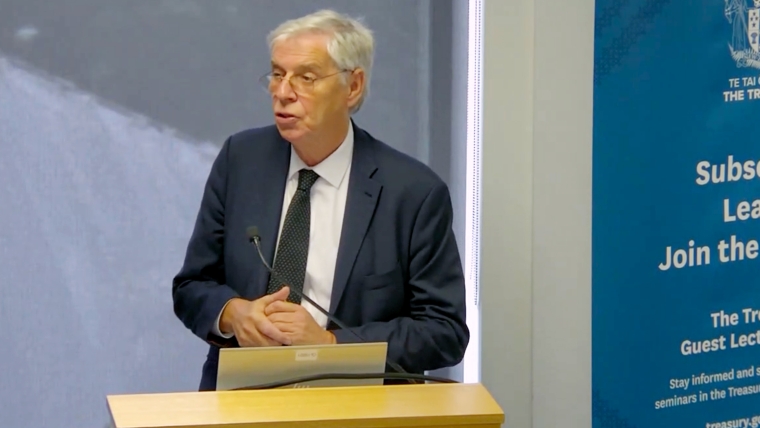Former IMF Deputy Director brings global perspective to critical fiscal decisions facing Aotearoa.
The Tax Policy Charitable Trust was delighted to host Michael (Mick) Keen as our 2025 visiting expert, continuing our tradition of bringing world-leading tax thinkers to New Zealand. Keen, former Deputy Director of the Fiscal Affairs Department at the International Monetary Fund, now with Tokyo College in the University of Tokyo and co-author of Rebellion, Rascals and Revenue, has advised over 40 countries on tax matters.
His visit came at a crucial moment, with Inland Revenue’s Long Term Insights Briefing highlighting projected spending increases of approximately 6% of GDP by 2060 from health and pension costs, and international tax frameworks under increasing pressure.
“New Zealand has one of the best tax systems in the world – it’s principled and you can see what it’s trying to achieve,” Keen observed. But the fiscal arithmetic is clear: difficult choices lie ahead
Wellington and Auckland Engagements

Michael Keen gives a public lecture at New Zealand Treasury in 2025
In Wellington, Mick delivered a Treasury Guest Lecture exploring how to future-proof New Zealand’s tax system in the face of rising fiscal pressures. The Trust also arranged meetings with Treasury, Inland Revenue, and politicians , where Mick discussed policy options.
In Auckland, the Trust hosted a public panel event “New Zealand’s Tax Future: Revenue, Investment and Global Challenges” where Mick presented alongside Robyn Walker (Deloitte) and Kelly Eckhold (Westpac).
The discussion explored the future of New Zealand’s tax system – from addressing revenue needs to navigating international tax pressures. Participants highlighted the urgency of reform, with projections showing debt could reach unsustainable levels approaching 190% of GDP without action. The debate ranged from the complexity of capital gains taxes (noting Australian CGT rules span 850 pages) to GST increases, which emerged as potentially efficient but with significant political constraints.
The Trust also organised roundtable discussions with leading tax practitioners, providing opportunities for in-depth technical discussions about New Zealand’s tax future.
Media Engagement

Michael Keen speaking with Jack Tame on Q+A
Keen’s insights reached broader audiences through strategic media appearances:
- TVNZ’s Q+A with Jack Tame
- An in-depth interview with NBR “Capital gains tax debate ‘sucks air out of room‘”
- The NZ Initiative podcast “When Tax Policy Goes Wrong,” discussing cautionary tales from international experience.
Key Insights
Throughout his visit, several key themes emerged from Keen’s presentations:
The Integration Challenge: Keen highlighted the inconsistency in New Zealand’s approach to capital gains taxation, arguing it deviates from the principled comprehensive income tax model the country otherwise follows.
The GST Opportunity: Keen reinforced New Zealand’s GST as world-class, and suggested this would be the first place to look if the Government was after revenue. He suggested that increasing the rate to the EU average could generate 4-4.5% of GDP in additional revenue, though compensation mechanisms for vulnerable populations require careful design.
Improving Productivity: Keen suggested that the corporate tax base was best placed to delivery productivity gains. He noted that the recent Investment Boost policy was a good example. He observed that NZ’s average effective tax rate on investment nonetheless remains high compared to the OECD average.
Capital Gains Tax? If NZ was to go to a comprehensive CGT (noting that we already tax some capital gains), Keen presented innovative solutions like accrual-equivalent capital gains schemes that could address economic distortions while maintaining administrative feasibility. Although no one had implemented a CGT in this way, Keen noted that NZ would have the capability to do this.
Taxing Wealth or Inheritance? Keen is not a fan of Wealth Taxes, and observed that other countries have voted with their feet by getting rid of them. He considers that they are ineffective, as the super wealthy can find loopholes, so only the middle group ends up paying them.
He does consider Inheritance Taxes to be superior to Wealth taxes, noting that the level at which the exemption is set is very important.
Lasting Impact
TPCT Chair Brendan Brown reflected: “You’ve done exactly what we hoped to achieve with your visit – challenged us to think about things in a different way.”
Keen offered both reassurance and challenge: “I don’t think New Zealand’s in a particularly bad position relative to others. Debt ratio is not that high and it’s not actually too hard to see where if you’re really pushed, you could raise some revenue. It’s great that New Zealand is thinking about it in a structured way – many other countries aren’t.”
The visit reinforced TPCT’s mission to ensure New Zealand benefits from leading international tax thinking. In an increasingly complex global tax environment, such exchanges are vital for developing robust, principled policies that can address our long-term fiscal challenges while maintaining what makes New Zealand’s tax system admired worldwide.
The Tax Policy Charitable Trust thanks Tax Management New Zealand, EY and Bell Gully for their support, and all participants who contributed to making Mick Keen’s visit a success.

